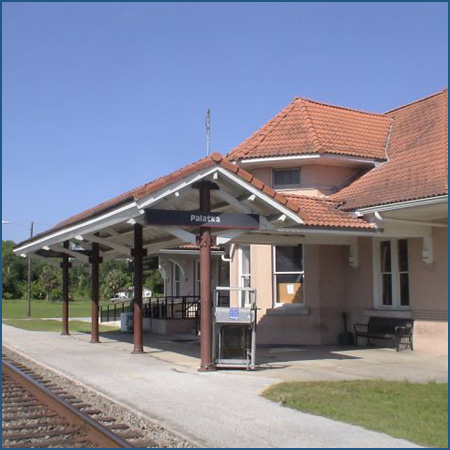Palatka, FL (PAK)
The former Atlantic Coast Line depot, listed on the National Register of Historic Places, now houses a popular railroad museum.

220 North 11th Street
Palatka, FL 32177-3615
Annual Station Ridership (FY 2024): 13,522
- Facility Ownership: City of Palatka
- Parking Lot Ownership: City of Palatka
- Platform Ownership: City of Palatka
- Track Ownership: CSX Transportation
Todd Stennis
Regional Contact
governmentaffairsnol@amtrak.com
For information about Amtrak fares and schedules, please visit Amtrak.com or call 1-800-USA-RAIL (1-800-872-7245).
The Amtrak station at Palatka consists of a platform adjacent to the historic one-story brick depot, known locally as the “Old ACL Union Depot.” The structure was built for the Atlantic Coast Line Railroad in 1908 in the Richardson Romanesque style and originally served as a junction for the Florida Southern Railway, Georgia Southern and Florida Railroad, and the Palatka Branch of the Florida East Coast Railroad. It was added to the National Register of Historic Places in 1988. The most recent renovation was bid in 2007 and completed in 2008 by Robert E. Taylor, Architect, PA. The renovation repaired and refurbished interior items including the heating/cooling/ventilation system, restrooms, ceilings and floors.
The Palatka Railroad Preservation Society and the Browning Railroad Museum have exhibition space in the station. The society was founded to preserve and promote the rail heritage of Palatka and surrounding communities, which it does by collecting and cataloging artifacts and documents relevant to the region’s railroads. The museum contains a variety of historic photographs, maps, signs and other items, as well as a model train layout.
Palatka, which sits on the west bank of the St. Johns River in northeastern Florida, is also the seat of Putnam County. The name comes from the Seminole, “pilo-taikita,” or boat crossing, as the St. Johns River narrows and begins a shallower winding course upstream to Lake George and Lake Monroe.
In 1763, the Treaty of Paris ceded control of Florida to the English, and in 1767, an English philanthropist and nobleman, John Rolle, established Rollestown on the east bank of the St. Johns River as a utopian commercial and humanitarian experiment. He recruited settlers off the streets of London, including paupers, vagrants, pickpockets, and “penitent” prostitutes. Arriving to clear the land and unaccustomed to either hard work or the subtropical climate, they soon scattered. Rolle imported slaves from West Africa to clear the land, tend livestock, and produce cotton, indigo and citrus for shipment back to England. However, when Spain resumed control of the colony in 1783, Rolle abandoned his unsuccessful colony and returned to England.
Due to friction with the native Seminole peoples, the Florida military established Fort Shannon at Palatka in 1838, as the location was still strategic for water travel. Fort Shannon was abandoned in 1843, but its piers and buildings provided the foundation for the town that became Palatka. In 1849, the growing Putnam County was formed with Palatka as its seat. The city incorporated In 1853.
During the 1850s the area gained a reputation as a haven for invalids escaping northern winters. Steamboats brought people upriver in an increasing tourist trade that was interrupted by the Civil War, when gunboats cruised the waters and Palatka became largely deserted. Following the war, tourists returned, and the area grew again. Its industries included logging, cattle and hog ranching and orange growing. The arrival of the railroads in the 1880s grew the town further. However, Palatka had a devastating fire in late 1884. The tourist trade never quite recovered thereafter, but the rebuilding of the downtown in less-flammable brick was seen as a great improvement. Today, tourism remains important.
Platform with Shelter
Features
- ATM not available
- No elevator
- No payphones
- No Quik-Trak kiosks
- No Restrooms
- Unaccompanied child travel not allowed
- No vending machines
- No WiFi
- Arrive at least 30 minutes prior to departure
Baggage
- Amtrak Express shipping not available
- No checked baggage service
- No checked baggage storage
- Bike boxes not available
- No baggage carts
- Ski bags not available
- No bag storage
- Shipping boxes not available
- No baggage assistance
Parking
- Same-day parking is available; fees may apply
- Overnight parking is available; fees may apply
Accessibility
- No payphones
- Accessible platform
- Accessible restrooms
- No accessible ticket office
- Accessible waiting room
- Accessible water fountain
- Same-day, accessible parking is available; fees may apply
- Overnight, accessible parking is available; fees may apply
- No high platform
- No wheelchair
- Wheelchair lift available
Hours
Station Waiting Room Hours
| Mon | 06:00 am - 06:30 pm |
| Tue | 06:00 am - 06:30 pm |
| Wed | 06:00 am - 06:30 pm |
| Thu | 06:00 am - 06:30 pm |
| Fri | 06:00 am - 06:30 pm |
| Sat | 06:00 am - 10:00 am 02:30 pm - 06:30 pm |
| Sun | 06:00 am - 10:00 am 02:30 pm - 06:30 pm |


 Amtrak established the Great American Stations Project in 2006 to educate communities on the benefits of redeveloping train stations, offer tools to community leaders to preserve their stations, and provide the appropriate Amtrak resources.
Amtrak established the Great American Stations Project in 2006 to educate communities on the benefits of redeveloping train stations, offer tools to community leaders to preserve their stations, and provide the appropriate Amtrak resources. For more than 50 years, Amtrak has connected America and modernized train travel. Offering a safe, environmentally efficient way to reach more than 500 destinations across 46 states and parts of Canada, Amtrak provides travelers with an experience that sets a new standard. Book travel, check train status, access your eTicket and more through the
For more than 50 years, Amtrak has connected America and modernized train travel. Offering a safe, environmentally efficient way to reach more than 500 destinations across 46 states and parts of Canada, Amtrak provides travelers with an experience that sets a new standard. Book travel, check train status, access your eTicket and more through the